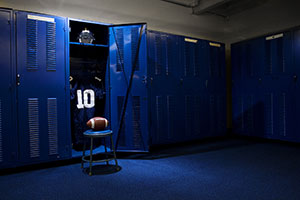Collectors of sports memorabilia sued Eli Manning and the New York Giants, as well as the team’s equipment managers and a company that sells “game-worn” equipment, claiming that they engaged in fraud. The collectors alleged that Manning was vouching for the authenticity of game-worn helmets and jerseys that, in fact, he had not worn in a game.
The lead plaintiff, Eric Inselberg, says he asked the Giants to authenticate the helmets as game-worn, which the Giants did not do. The plaintiffs also based their allegations on a suspicious email from Manning that asks an equipment staffer for “2 helmets that can pass as game used.” According to Manning’s lawyer, Manning was asking for two helmets that had been used in a game, an interpretation that is difficult to square with the words “pass as” that Manning actually used.
Inselberg sent an email to a Giants’ equipment manager after purchasing helmets that Manning had purportedly worn in games. The email asked: “Are these the bs ones eli asked you to make up because he didn’t want to give up the real stuff?” The equipment manager responded with an email that said: “BS ones, you are correct.”
Manning and the Giants were unable to obtain a dismissal of the lawsuit prior to trial. The collectors and the Giants both relied on expert witnesses in submissions they made to the court and were expected to call those witnesses to testify at trial.
Lawsuit Allegations
Inselberg is an enthusiastic collector of Giants memorabilia. He also sells sports memorabilia. In 2011, the FBI claimed that Inselberg was fraudulently selling fake game-worn jerseys. When Inselberg explained that he was getting the jerseys from an equipment staffer, the staffer denied that he provided jerseys to Inselberg. That denial wasn’t surprising, since equipment managers aren’t supposed to enrich private dealers in sports memorabilia, but Inselberg was able to produce cancelled checks to an equipment manager for team jerseys. The equipment manager later admitted that he had been selling equipment to Inselberg for years.
Prosecutors nevertheless charged Inselberg with mail fraud for falsely selling equipment that he represented to be game-worn. More than a year later, after Inselberg’s attorneys amassed evidence that the equipment manager had been selling Inselberg equipment that was falsely represented as having been game-used, prosecutors dropped the charges. The Giants do not dispute that equipment staffers may have engaged in misconduct in 2011, but contend that no fraud occurred in later years.
Inselberg nevertheless sued the Giants and Manning for allegedly engaging in a scheme to scuff helmets and stain jerseys so that they could be sold as “game-worn.” The lawsuit accused the Giants of keeping the FBI’s attention focused on Inselberg in order to divert law enforcement’s attention from the wrongdoing of Giants’ employees.
Unlike Major League baseball, which makes a strong effort to authenticate each item that was worn or used in a game, the NFL has done little to curb fraudulent sales of game-used equipment. The league leaves authentication to each team. According to Inselberg, the Giants made no effort to police the authenticity of equipment that players or equipment managers sold or donated.
Expert Witnesses
Experts use a process of “photo matching” to authenticate a claim that a jersey or helmet was worn during a game. The expert compares the jersey to photos of players that were taken during the game. While an apparently identical jersey might not prove that a jersey was worn during a game, differences in appearance might be taken as evidence that the jersey is a fake.
Inselberg survived summary judgment by presenting the expert opinion of John Robinson of Resolution Photo-Matching. Robinson determined that photos of four out of five helmets he examined, despite being sold as game-used by Eli Manning, did not match photographs of the helmets Manning wore in those games. Robinson opined that Manning probably never wore them in a game.
The Giants retained their own expert, Troy Kinunen, who testified in a deposition that photo-matching is not a reliable way to assess a jersey’s or helmet’s authenticity. According to Kinunen, photo matching “does not take into account that helmets are routinely reconditioned during or after a season, the evidence of which might be found on the inside of the helmet and not the outside.”
Settlement
While the expert testimony may not have been conclusive, it strengthened Iselberg’s case. Coupled with the suspicious emails, Iselberg may have been able to persuade a jury that he was only arrested by the FBI because he had been the victim of false representations that the equipment he sold had been used in Giants’ games. Iselberg claimed that the arrest damaged his reputation and hurt his business.
Manning has consistently denied any wrongdoing. He had much to lose if he lost the trial, as the NFL may have viewed a verdict in Iselberg’s favor as reason to impose a multiple-game suspension on Manning for violating the NFL Conduct Policy. The Giants, meanwhile, have contended that the organization never authorized equipment managers to engage in memorabilia fraud, a position that essentially threw equipment staff under the bus if the jury believed that fraud actually occurred.
With so much at stake, it isn’t surprising that the case settled before Manning had to take the stand and testify. The terms of the settlement are confidential, and the parties released a joint statement reminding the public that neither Iselberg’s claims nor the Giants’ defenses are supported by the settlement agreement.




